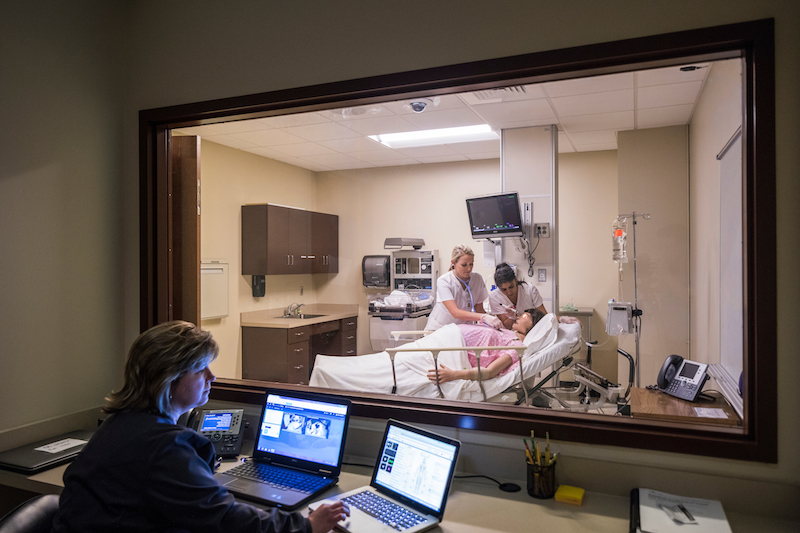
Samford University’s Experiential Learning and Simulation Center in the College of Health Sciences is on track to become the second fully accredited simulation center in Alabama after receiving provisional accreditation from the Society of Simulation in Healthcare this month.
This achievement recognizes the exceptional work of Samford faculty in providing revolutionary simulation experiences for students preparing for careers in health care.
The Society of Simulation in Healthcare is the largest health care simulation accrediting body in the world with 104 fully accredited simulation programs in 11 countries. Since Samford’s center is new, the society requires the university to maintain provisional accreditation for two years, at which point it will be eligible to apply for full accreditation.
Spanning 22,000 square feet in the College of Health Sciences facilities, the Experiential Learning and Simulation Center is designed to serve as the hub for simulation and interprofessional activities within the college and its fours schools—School of Health Professions, Ida Moffett School of Nursing, McWhorter School of Pharmacy and School of Public Health.
This interprofessional nature of the center reflects the mission of the College of Health Sciences, and it’s distinctive in its purpose of serving the entire college and not one or two specific programs.
“Our space is unique because everything is contained within a single floor,” said Jill Pence, executive director of the Experiential Learning and Simulation Center. “The combination of having different levels of simulation—from clinical labs to our high-fidelity suite—within the same space gives our students the advantage of experiencing various clinical settings before stepping into practice.”
During the 2017-18 academic year, the center measured 16,000 student visits to the floor, and this number is projected to increase with new academic programs on the horizon.
“As humans, we learn best by what we do wrong, which is why we give students an environment where making a mistake is okay,” Pence said. “Simulation gives students a space to test the knowledge and skills they gain in the classroom in a safe environment, so when they go into the clinical setting, they can safely apply what they know and not make critical mistakes.”
To help make simulation experiences as realistic as possible, the Experiential Learning and Simulation Center utilizes clinical resources like an electronic health record designed for simulation and standardized patients, which are actors hired to play the role of a patient or family member.
“Having a standardized patient program brings an entirely new dimension to simulation,” Pence said. “It allows our students to have a dynamic interaction with a human they don’t know, which is something a mannikin or faculty member just can’t replicate.”
The center met all required standards with no recommendations or further requirements from the accreditation committee on the self-study it submitted as part of the accreditation process. Now that provisional accreditation has been granted, the center will immediately begin working on meeting requirements for full accreditation in 2020.
“It has been amazing to witness the growth of our Experiential Learning and Simulation Center,” said Nena Sanders, vice provost of Samford’s College of Health Sciences. “From the nursing school’s one-room simulation lab in 2008 to the dynamic center we have today, I am immensely proud of our faculty whose dedication has not only meet the standards of our accrediting body—but dare I say, exceeded them.”
